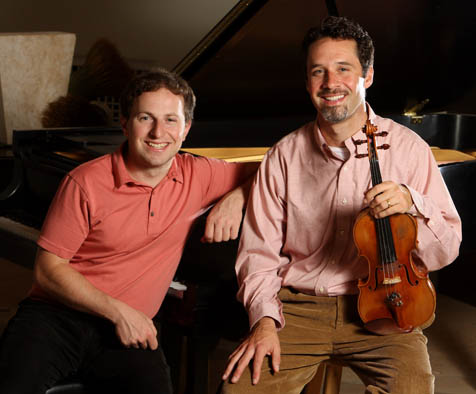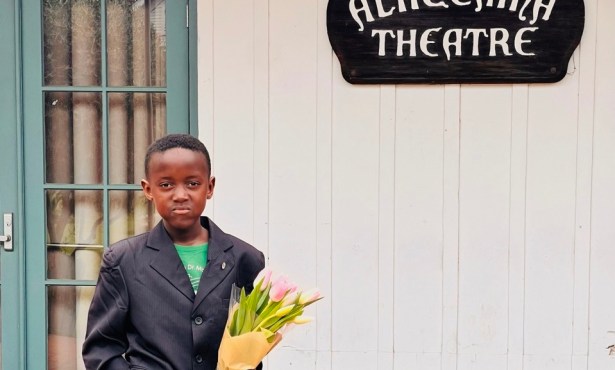Philip Ficsor’s American Double and The Bolcom Project
Bold, Passionate

What will it take to bring classical music to the forefront of American culture? Recent business decisions at major record labels have left hundreds of established performers without current recording contracts, and the excitement of new venues like Disney Hall in Los Angeles or our very own soon-to-be-open Granada Theatre can only do so much to offset the aging of classical music’s core audience. Skepticism abounds, yet in the midst of such chaos, some younger musicians are taking what at first might seem an unlikely route toward the future-scholarly attention to the music of living composers.
One leader of this new school is violinist Philip Ficsor-a graduate of Yale, the University of Michigan, and Boston University-who is now assistant professor of violin at Westmont College. In September 2007, Ficsor and pianist Constantine Finehouse released a marvelous two-CD set of music for violin and piano by William Bolcom.

Bolcom, who was in Santa Barbara just last spring to play at a tribute to the violist Donald McInnes, is one of the greatest living American composers. His monumental oratorio Songs of Innocence and Experience, based on the poetry of William Blake, is a supreme example of late-20th century neotonalism, full of brilliant, disciplined traditional composition and leavened with everything from ragtime to reggae.
Ficsor and Finehouse formed American Double to explore the intense, beautiful, and difficult music Bolcom has written during several decades. The Bolcom Project CD, on Albany records and available through the duo’s excellent Web site (americandouble.com), is not only an essential document of this major composer’s work; it is also a thrilling example of the kind of truly progressive music a great piano/violin duo can create. In 2008, American Double will tour the eastern United States to play this music and appear with Bolcom at such distinguished venues as Yale, Harvard, and New York’s Steinway Hall. In Santa Barbara, Ficsor will appear as part of an 80th birthday celebration for composer Emma Lou Diemer at the Unitarian Society on Wednesday, December 12, at 11 a.m. I spoke with Ficsor recently about the project, Bolcom, and the future of classical music.
What was it about William Bolcom’s compositions that convinced you to devote so much time and energy to his work? The emotional range of the material is amazing. With great composers, you are always asking what makes them great. All good composers know the conventions, but the great ones are compelled by their genius to write things that are different. Why is Mozart original in comparison to Salieri? He had to work at it. He had to think of new ways to solve these compositional puzzles, and he didn’t stop until he had it. The same with Beethoven. And this is what I feel in Bolcom as well. He doesn’t stop where an ordinary composer would. Instead he goes on, and the results are powerful.
How did Bolcom’s talent develop? Even as a child in Seattle, he was one of those rare pianists who could improvise in any style. He was a wunderkind, but his parents did not let him play the circuit, and I think he is actually grateful for that. In his music you get the sense that he is a real person. You know it is not always easy for great prodigies to live in the real world. Itzhak Perlman, whose life has been onstage since he was 14, has actually started a camp for these kids to help them acclimate to society outside the concert hall or the practice studio. But Bolcom’s not like that. He lives in the world, and it shows in his music.
How has it been working with him? Is he very strict about how his music should be played? Some composers are very strict about what’s marked on the page, and others are not. Bolcom is sort of in the middle-not too hung up on one interpretation, and genuinely interested in what you have to bring to his music.
When I heard Bolcom play at the Biltmore last March, he played some marvelous ragtime pieces that he had written. How does that music fit in with his overall style and achievement? Yes, he is well known for that now, but it was not always that way. It was a courageous step for him to do all the ragtime stuff in the 1950s. It’s okay for us to look back in retrospect and say that was the way things were going, but he didn’t know that then. He is in many ways a conservative composer, and that was not at all the style of the day. In terms of style, he’s very quick and hard working, and it almost looks easy, but it’s not.
How did you connect with Constantine Finehouse? I needed a pianist for my degree recital at Yale, and I wanted to play this Ezra Laderman duet that is very hard. I also played the [Beethoven] Kreutzer sonata, which is also hard, but obviously a bit better known. I found Constantine, and we started practicing. When we got to a point where the concert was only a couple weeks away, one afternoon I was in rehearsal with him and I just felt it was not there, so I sort of put my foot down. I don’t know whether I said “You have to practice more” or not, but I could have, and he was upset. But we used it as a way to get even more serious, and we played both pieces very well. I think we played the Kreutzer about as well as you can play it for the first time through.
And how did you two move on to creating American Double? We were driving together from Boston to New Haven, and I guess on the drive I had the idea. The audition for Bolcom took place in the Chelsea Hotel in New York, with Constantine playing a very inferior baby grand piano. It was really a wreck, but somehow the music and our intention came through and Bolcom agreed to the project.
You memorize this music in order to play it, which is a little unusual for chamber music. Why do you do it that way? Yes, we memorize, which seems so pretentious, but I notice more musicians are doing it all the time. For me, it’s about getting more deeply into the music. I mean, look at concertos-why do people memorize them? Because they are hard, and because you end up memorizing them anyway, so you might as well just get started. And the memorization has a function because it reinforces your sense of the form. If you don’t understand how the Brahms concerto is put together, and you are up there without music, you are going to have to be careful that you don’t end up repeating. In a chamber setting, the payoff comes when that barrier of the sheet music is removed, and you can really connect with the audience. When we played in Santa Barbara, I could face out and look at everyone, and not have my head buried in the music.
What’s the greatest part of this project for you? Taking the whole context, and being able to knit that together. We say to each other that playing this music is like coming home.
4•1•1
Philip Ficsor will perform at the Unitarian Society of Santa Barbara (1535 Santa Barbara St.) on Wednesday, December 12, at 11 a.m. The event is free and open to the public. For more information, call 965-4583 or visit ussb.org. For more on American Double, visit americandouble.com.



